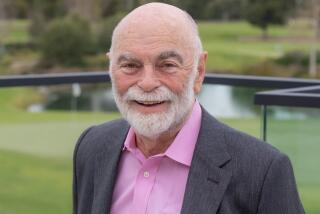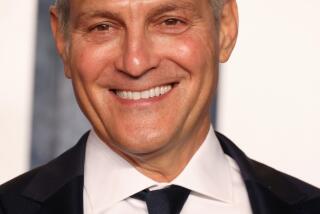High-Power Agency to Compete on Sports’ Turf
After years spent largely on the sidelines, Hollywood’s most powerful talent agency is blitzing the sports world.
In little more than a week, Creative Artists Agency hired three top sports agents representing such stars as NFL quarterback Peyton Manning and New York Yankee heartthrob Derek Jeter.
With the NFL draft looming on April 29, USC star quarterback Matt Leinart this week dumped veteran agent Leigh Steinberg. Leinart is reportedly considering replacing the Newport Beach-based agent with CAA, which already represents him for endorsements. Leinart is expected to be one of the first players chosen in the draft.
Though agencies sometimes negotiate off-the-field endorsement deals for athletes, they generally don’t negotiate their contracts with teams.
As the line separating athletics and entertainment blurs, similar moves are expected as Hollywood looks to sports to generate an endless stream of content that it can package and repackage.
“Access to a superstar athlete can be invaluable for an entertainment agency,” Steinberg said. “So I’d expect to see more of these deals. There’s a sea change occurring.”
What agencies bring to the field is the ability to mold athletes into global celebrities, product endorsers and partners in potentially lucrative entertainment ventures.
Former Laker star Magic Johnson leveraged his celebrity into a successful business career. Manning has a second career as a star in commercials. Los Angeles Clippers basketball star Elton Brand moonlights as a movie producer. Jeter and New England Patriots quarterback Tom Brady each hosted “Saturday Night Live.”
A Leinart spokesman said the quarterback would announce his decision on an agent next week.
For CAA, which declined to comment for this story, the larger question is whether it can turn sports into a significant moneymaker when its bedrock business of representing stars and directors is suffering amid tighter entertainment economics.
Hollywood agencies historically have avoided negotiating on behalf of stars in team sports, in part because player unions make them work under tight rules. NFL agents, for example, can take a maximum 3% commission, compared with the 10% norm agents take when representing actors.
In addition, the typical NFL player contract is relatively small compared to what the Leinarts of the sport can command. And a star athlete’s career can end on a single play.
Some sports agents who continue to operate their own, independent shops questioned what a Hollywood agency would bring to athletes. Casey Wasserman, whose Los Angeles-based Wasserman Media Group represents athletes in contract negotiations and arranges marketing and business opportunities for them, described Manning representative Tom Condon as “a great football agent.”
But, Wasserman said, Condon is not a better football agent simply because he is working at CAA, nor are his clients necessarily more marketable.
“Put it this way -- Kobe Bryant is a good rapper or he’s not. That isn’t going to change because of who represents him,” Wasserman said.
Geography also could limit Hollywood’s sporting life. Unlike the entertainment industry, which is anchored firmly in Hollywood, the sports business is much more dispersed. Condon works out of Kansas City, Mo. Jeter’s agent, Casey Close, works in New York.
“Everyone who wants to be in the entertainment industry is in L.A.,” Wasserman said. “In sports, it’s the exact opposite. If you live in Columbus, Ohio, and your buddies are kids who are playing football at Ohio State, all of a sudden, you’re an agent.”
Last month, Steve Feldman, a longtime football agent, moved his roster of players, including Rodney Harrison of the New England Patriots and Lorenzo Neal of the San Diego Chargers, into the Beverly Hills-based Gersh Agency.
“Sports are just another form of entertainment; the players are in front of the TV every week,” agency chief David Gersh said.
But some agencies prefer athletes who aren’t in team sports represented by unions because they offer bigger potential commissions.
The William Morris Agency represents tennis star Serena Williams and teen golfer Michelle Wie -- who has reportedly garnered as much as $12 million in endorsement deals since turning pro in October. United Talent Agency represents tennis player Anna Kournikova in endorsements, and recently signed figure skater Michelle Kwan. Before its latest moves, CAA has represented such individual stars as skateboarder Tony Hawk and surfer Laird Hamilton.
For CAA, last week’s hiring of football agents Condon and Ken Kremer, who bring with them more than 70 players, represents its biggest move yet into sports.
But CAA won’t reap the benefits immediately. According to competitors who considered hiring them, the football agents wanted as much as $30 million to relocate their business.
Condon also has financial obligations to his past employer, International Management Group, stemming from deals he made for his clients there. In a statement, IMG said Condon’s contract guarantees that IMG “will continue to earn essentially the same profits in football over the next three years” regardless of where he works.
For its part, the NFL Players Assn. union maintains that the intersection of Hollywood and sports -- and the endorsements and celebrity deals powerful agencies can bring -- won’t change what it expects from player representatives.
“We certify individuals, not companies,” said Mark Levin, director of the players union’s Salary Cap and Agent Administration. “What we want is evidence that an agent is representing a player properly by protecting his rights. All the other stuff is not important.”
More to Read
Go beyond the scoreboard
Get the latest on L.A.'s teams in the daily Sports Report newsletter.
You may occasionally receive promotional content from the Los Angeles Times.










